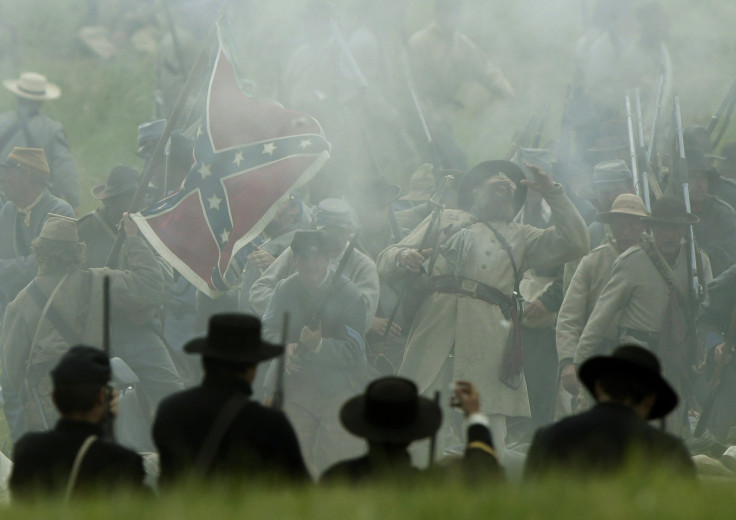Civil War Battles Timeline 1861-65: 35 Facts On 150th Anniversary Of Robert E. Lee's Confederate Surrender

Thursday will mark 150 years since the Civil War -- often known as America's deadliest conflict -- came to an end. On April 9, 1865, Confederate Gen. Robert E. Lee surrendered to Union Gen. Ulysses S. Grant in Appomattox, Virginia. An estimated 750,000 people died in the four-year-long fight, and President Abraham Lincoln was assassinated days later.
The Civil War, which was born out of a national argument over slavery, was a sign that "the nation is beginning a new life," as Lincoln told Congress in 1863. More than a century later, here's a look at some of the biggest events in the conflict, compiled from the National Parks Service and CivilWar.com.
Nov. 6, 1860: Lincoln gets elected president of the U.S. He's a member of the Republican Party, a group widely supported in the North, and opposes slavery.
Dec. 20, 1860: Upset with Lincoln's victory and worried he'll abolish slavery, South Carolina issues its Ordinance of Secession.
Jan. 9 through Feb. 9, 1861: Mississippi, Florida, Alabama, Georgia, Louisiana and Texas secede from the Union. They form the Confederate States of America.
Feb. 18, 1861: The Confederacy appoints former Sen. Jefferson Davis, D-Miss., as president.
March 4, 1861: Lincoln gets inaugurated.
April 12, 1861: Confederate troops fire shots at Fort Sumter in Charleston, South Carolina, which officially starts the Civil War.
April 15, 1861: Lincoln proclaims a state of insurrection. He also asks for a special session of Congress and requests 75,000 people to fight the rebels. By May 3, he's calling for 43,000 more volunteers.
April 17 through May 20, 1861: Virginia, Arkansas, Tennessee and North Carolina secede.
May 29, 1861: Richmond, Virginia, is named the Confederacy's capital.
July 21, 1861: The two sides clash near Manassas, Virginia, at the Battle of Bull Run. The Confederates win, and Lincoln realizes the scope of the fight. "It's bad. It's damned bad," he says.
Aug. 28-29, 1861: The Union wins at the Battle of Hattera Inlet Batteries. They start to close southern ports along the East Coast.
Feb. 6, 1862: Grant captures Fort Henry in Tennessee.
Feb. 22, 1862: Davis gets inaugurated.
April 6-7, 1862: The Union soldiers win at the Battle of Shiloh in Tennessee.
May 31 to June 1, 1862: Gen. Joseph Johnston, a commander of the Confederate army, gets wounded. Lee takes over.
Aug. 30-31, 1862: The Confederacy wins the second Battle of Bull Run, sending the Union forces back to Washington, D.C.
Sept. 17, 1862: The Battle of Antietam in Maryland becomes the bloodiest day in American military history when more than 22,000 people die.
Sept. 22, 1862: Lincoln issues the Emancipation Proclamation.
Dec. 13, 1862: The Confederacy defeats the Union at the Battle of Fredericksburg in Virginia. Lee famously says, "It is well that war is so terrible -- we should grow too fond of it."
Jan. 1, 1863: The Emancipation Proclamation takes effect and frees slaves.
March 3, 1863: The Union starts drafting soldiers. The Confederacy had already adopted the conscription practice.
July 1-3, 1863: The Battle of Gettysburg takes place in Pennsylvania, and the Confederates are defeated.
July 4, 1863: The Union totally gains control of the Mississippi River, which divides the Confederacy into two pieces.
July 13-16, 1863: Civilians fight conscription, which they think unfairly favors rich people, during draft riots in New York City.
Nov. 19, 1863: Lincoln gives the Gettysburg Address and repeats the idea that all men are created equal.
Nov. 23-25, 1863: The Union weakens the Confederacy at the Battle of Chattanooga in Tennessee.
March 2, 1864: Grant becomes lieutenant general of the Union armies.
June 28, 1864: Lincoln repeals the Fugitive Slave Laws.
Nov. 8, 1864: Lincoln gets re-elected.
Dec. 10, 1864: Union Gen. William T. Sherman ends his march to the sea in Savannah, Georgia. He gives the city to Lincoln as a Christmas present.
Jan. 31, 1865: Congress approves the 13th Amendment to the U.S. Constitution, which abolishes slavery.
Feb. 22, 1865: The Union closes the last big port in the South: Wilmington, North Carolina.
March 4, 1865: Lincoln is inaugurated.
April 3, 1865: The Union occupies Richmond, the Confederate capital.
April 9, 1865: Lee surrenders the Army of Northern Virginia near the Appomattox Court House in Virginia.
© Copyright IBTimes 2024. All rights reserved.





















